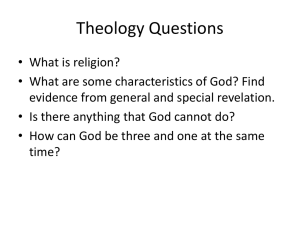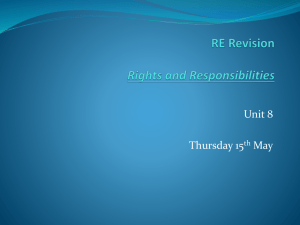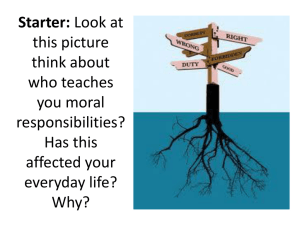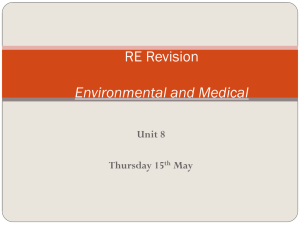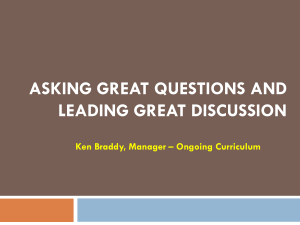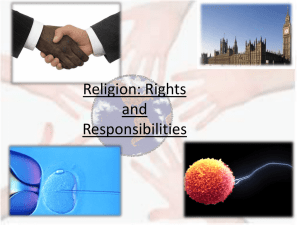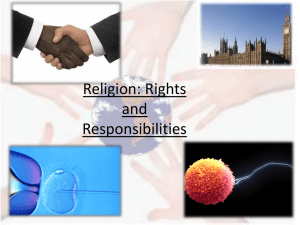Revision Map
advertisement
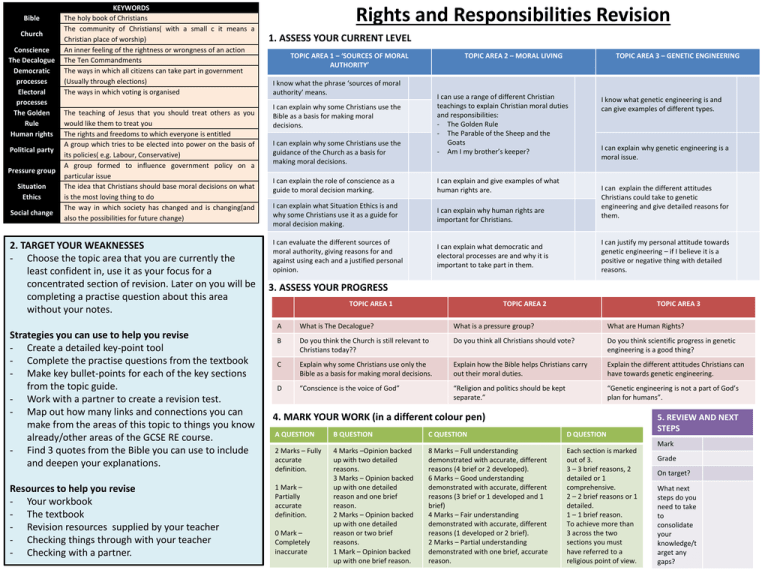
Bible Church Conscience The Decalogue Democratic processes Electoral processes The Golden Rule Human rights Political party Pressure group Situation Ethics Social change KEYWORDS The holy book of Christians The community of Christians( with a small c it means a Christian place of worship) An inner feeling of the rightness or wrongness of an action The Ten Commandments The ways in which all citizens can take part in government (Usually through elections) The ways in which voting is organised The teaching of Jesus that you should treat others as you would like them to treat you The rights and freedoms to which everyone is entitled A group which tries to be elected into power on the basis of its policies( e.g. Labour, Conservative) A group formed to influence government policy on a particular issue The idea that Christians should base moral decisions on what is the most loving thing to do The way in which society has changed and is changing(and also the possibilities for future change) 2. TARGET YOUR WEAKNESSES - Choose the topic area that you are currently the least confident in, use it as your focus for a concentrated section of revision. Later on you will be completing a practise question about this area without your notes. Strategies you can use to help you revise - Create a detailed key-point tool - Complete the practise questions from the textbook - Make key bullet-points for each of the key sections from the topic guide. - Work with a partner to create a revision test. - Map out how many links and connections you can make from the areas of this topic to things you know already/other areas of the GCSE RE course. - Find 3 quotes from the Bible you can use to include and deepen your explanations. Resources to help you revise - Your workbook - The textbook - Revision resources supplied by your teacher - Checking things through with your teacher - Checking with a partner. Rights and Responsibilities Revision 1. ASSESS YOUR CURRENT LEVEL TOPIC AREA 1 – ‘SOURCES OF MORAL AUTHORITY’ TOPIC AREA 2 – MORAL LIVING I know what the phrase ‘sources of moral authority’ means. TOPIC AREA 3 – GENETIC ENGINEERING I can use a range of different Christian teachings to explain Christian moral duties and responsibilities: - The Golden Rule - The Parable of the Sheep and the Goats - Am I my brother’s keeper? I can explain why some Christians use the Bible as a basis for making moral decisions. I can explain why some Christians use the guidance of the Church as a basis for making moral decisions. I can explain the role of conscience as a guide to moral decision marking. I can explain and give examples of what human rights are. I can explain what Situation Ethics is and why some Christians use it as a guide for moral decision making. I can explain why human rights are important for Christians. I can evaluate the different sources of moral authority, giving reasons for and against using each and a justified personal opinion. I can explain what democratic and electoral processes are and why it is important to take part in them. I know what genetic engineering is and can give examples of different types. I can explain why genetic engineering is a moral issue. I can explain the different attitudes Christians could take to genetic engineering and give detailed reasons for them. I can justify my personal attitude towards genetic engineering – if I believe it is a positive or negative thing with detailed reasons. 3. ASSESS YOUR PROGRESS TOPIC AREA 1 TOPIC AREA 2 TOPIC AREA 3 A What is The Decalogue? What is a pressure group? What are Human Rights? B Do you think the Church is still relevant to Christians today?? Do you think all Christians should vote? Do you think scientific progress in genetic engineering is a good thing? C Explain why some Christians use only the Bible as a basis for making moral decisions. Explain how the Bible helps Christians carry out their moral duties. Explain the different attitudes Christians can have towards genetic engineering. D “Conscience is the voice of God” “Religion and politics should be kept separate.” “Genetic engineering is not a part of God’s plan for humans”. 4. MARK YOUR WORK (in a different colour pen) A QUESTION B QUESTION C QUESTION D QUESTION 2 Marks – Fully accurate definition. 4 Marks –Opinion backed up with two detailed reasons. 3 Marks – Opinion backed up with one detailed reason and one brief reason. 2 Marks – Opinion backed up with one detailed reason or two brief reasons. 1 Mark – Opinion backed up with one brief reason. 8 Marks – Full understanding demonstrated with accurate, different reasons (4 brief or 2 developed). 6 Marks – Good understanding demonstrated with accurate, different reasons (3 brief or 1 developed and 1 brief) 4 Marks – Fair understanding demonstrated with accurate, different reasons (1 developed or 2 brief). 2 Marks – Partial understanding demonstrated with one brief, accurate reason. Each section is marked out of 3. 3 – 3 brief reasons, 2 detailed or 1 comprehensive. 2 – 2 brief reasons or 1 detailed. 1 – 1 brief reason. To achieve more than 3 across the two sections you must have referred to a religious point of view. 1 Mark – Partially accurate definition. 0 Mark – Completely inaccurate 5. REVIEW AND NEXT STEPS Mark Grade On target? What next steps do you need to take to consolidate your knowledge/t arget any gaps?

